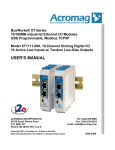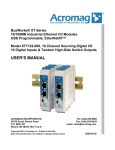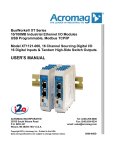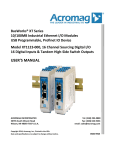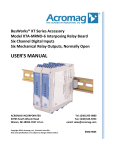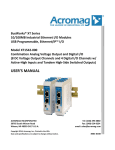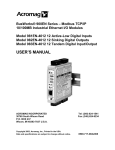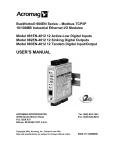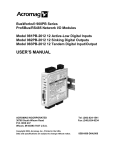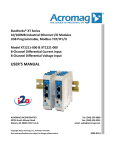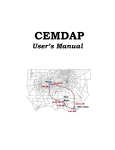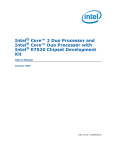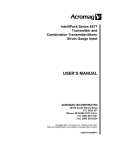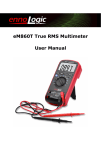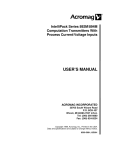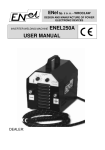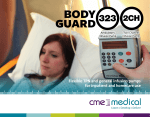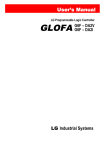Download 8500989 XT1112-000 User`s Manual
Transcript
BusWorks® XT Series 10/100MB Industrial Ethernet I/O Modules USB Programmable, EtherNet/IP™ Model XT1112-000, 16 Channel Sinking Digital I/O 16 Active-Low Inputs w/ Tandem Low-Side Outputs USER’S MANUAL ACROMAG INCORPORATED 30765 South Wixom Road P.O. BOX 437 Wixom, MI 48393-7037 U.S.A. Copyright 2014, Acromag, Inc., Printed in the USA. Data and specifications are subject to change without notice. Tel: (248) 295-0880 Fax: (248) 624-9234 email: [email protected] 8500-989E BusWorks Model XT1112-000 16 Channel Sinking DIO w/USB & Ethernet/IP™ Table of Contents GETTING STARTED DESCRIPTION ....................................................................................................... 4 Key Features ........................................................................................................................4 Application ..........................................................................................................................4 Mechanical Dimensions .......................................................................................................5 DIN Rail Mounting & Removal ..............................................................................................5 ELECTRICAL CONNECTIONS ............................................................................ 6 Power Connections ..............................................................................................................7 Excitation Connections.........................................................................................................8 USB Connection ...................................................................................................................9 Digital Input Connections ................................................................................................... 10 Digital Output Connections ................................................................................................ 12 EMI Filter Installation......................................................................................................... 13 Earth Ground Connections ................................................................................................. 14 CONFIGURATION SOFTWARE ...................................................................... 15 Quick Overview ................................................................................................................. 15 TECHNICAL REFERENCE CONFIGURATION STEP-BY-STEP ................................................................ 17 Getting Connected ............................................................................................................. 17 Device/Communication Setup ............................................................................................ 18 I/O Configuration & Test Page ............................................................................................ 21 Network Home Page .......................................................................................................... 22 BLOCK DIAGRAM ............................................................................................. 24 How It Works ..................................................................................................................... 24 About Ethernet/IP™ ........................................................................................................... 25 Object Models ................................................................................................................... 25 Assembly Object ................................................................................................................ 27 EDS File (Electronic Data Sheet) ......................................................................................... 28 TROUBLESHOOTING ....................................................................................... 29 Diagnostics Table ............................................................................................................... 29 Service & Repair Assistance ............................................................................................... 31 Acromag, Inc. Tel: 248-295-0880 -2--2- http://www.acromag.com http://www.acromag.com BusWorks Model XT1112-000 16 Channel Sinking DIO w/USB & Ethernet/IP™ ACCESSORIES .................................................................................................... 32 Software Interface Package................................................................................................ 32 USB Isolator ....................................................................................................................... 32 USB A-B Cable .................................................................................................................... 32 USB A-mini B Cable ............................................................................................................ 32 DIN Rail Bus Connector Kit ................................................................................................. 33 Low EMI Double-Shielded Patch Cable ............................................................................... 33 SPECIFICATIONS .............................................................................................. 34 Model Number .................................................................................................................. 34 Digital Inputs ..................................................................................................................... 34 Digital Outputs .................................................................................................................. 35 General ............................................................................................................................. 36 Power ................................................................................................................................ 36 USB Interface ..................................................................................................................... 36 Ethernet Interface.............................................................................................................. 37 Enclosure & Physical .......................................................................................................... 38 Environmental ................................................................................................................... 38 Agency Approvals .............................................................................................................. 40 Reliability Prediction .......................................................................................................... 40 Configuration Controls ....................................................................................................... 40 All trademarks are the property of their respective owners. IMPORTANT SAFETY CONSIDERATIONS You must consider the possible negative effects of power, wiring, component, sensor, or software failure in the design of any type of control or monitoring system. This is very important where property loss or human life is involved. It is important that you perform satisfactory overall system design and it is agreed between you and Acromag, that this is your responsibility. The information of this manual may change without notice. Acromag makes no warranty of any kind with regard to this material, including, but not limited to, the implied warranties of merchantability and fitness for a particular purpose. Further, Acromag assumes no responsibility for any errors that may appear in this manual and makes no commitment to update, or keep current, the information contained in this manual. No part of this manual may be copied, or reproduced in any form without the prior written consent of Acromag, Inc. Acromag, Inc. Tel: 248-295-0880 -3--3- http://www.acromag.com http://www.acromag.com BusWorks Model XT1112-000 16 Channel Sinking DIO w/USB & Ethernet/IP™ GETTING STARTED DESCRIPTION The XT1112-000 is an Ethernet/IP™ network control module for interface with up to 16 channels of digital input/output for low-side (sinking) applications. This unit is setup and configured for network communication via a USB connection to any Windows-based PC (Windows XP and later versions only). The unit provides I/O channel isolation from network and power. Key Features CE Approved, UL/cUL Class 1, Division 2 Approved. Designed and Manufactured with High Quality/High Reliability with AS9100 (Aerospace Quality)/ISO9001. Ethernet/IP™ Protocol Support for up to 10 connected messaging sessions, plus unconnected messaging. Conveniently setup and configured w/ Windows software via USB. High-Density 22.5mm wide package with pluggable, front-facing terminals. Dual Isolated, auto-crossing 10/100Mbps Ethernet ports w/ Auto-Negotiation offers convenient “daisy chain” network connection which saves switch ports. Operation & Diagnostic LED indicators aide trouble-shooting. Bus Power and Bus Excitation Ready for Clean Wiring along the DIN Rail, or for Redundant Power and/or Redundant Excitation Connection. High 1500VAC Isolation between I/O Channels (as a group), the network (including port-to-port), and power. I/O, power, excitation, network, & USB ports are all transient protected. Tandem Input/Output channels allow loop-back monitoring of outputs. Discrete open-drain outputs switch up to 32V and 250mA each. Inputs use TTL thresholds and support up to 32V DC. Active-Low inputs include user-selectable logic inversion for inputs. I/O channels include 10K ohm pull-ups to Excitation. Outputs have built-in protection for transients & thermal overload. Failsafe Mode support w/Watchdog Timeout Control. Wide-range DC power input from 12-32V. Wide ambient temperature operation from -40°C to +70°C. Thoroughly Tested and Hardened For Harsh Environments. Withstands High Shock (25G) and Vibration (4G). Application This module is designed for high-density mounting on T-type DIN rails and units may be mounted side-by-side on 22.5mm centers and can plug-together for modular expansion, optionally sharing power and/or excitation connections along the DIN rail. This model will interface with any mix of up to 16 digital inputs and/or outputs controlled/monitored via a 10/100Mbps Ethernet interface using the Ethernet/IP™ application protocol. Outputs are open-drain, switch up to 32V, and sink up to 250mA each. Inputs are TTL and accept up to 32V. The unit is conveniently setup and configured for network operation via a USB connection to a host personal computer running Acromag configuration software. Acromag, Inc. Tel: 248-295-0880 -4--4- http://www.acromag.com http://www.acromag.com BusWorks Model XT1112-000 16 Channel Sinking DIO w/USB & Ethernet/IP™ Mechanical Dimensions 99.0 (3.90) Units may be mounted to 35mm “T” type DIN rail (35mm, type EN50022), and side-by-side on 22.5mm (0.9-inch) centers. WARNING: IEC Safety Standards may require that this device be mounted within an approved metal enclosure or sub-system, particularly for applications with exposure to voltages greater than or equal to 75VDC or 50VAC. 22.5 (0.89) 114.5 (4.51) DIMENSIONS ARE IN MILLIMETERS (INCHES) DIN Rail Mounting & Removal Refer to the following figure for attaching and removing a unit from the DIN rail. A spring loaded DIN clip is located on the bottom side. The opposite rounded edge at the bottom of the top side allows you to tilt the unit upward to lift it from the rail while prying the spring clip back with a screwdriver. To attach the module to T-type DIN rail, angle the top of the unit towards the rail and place the top groove of the module over the upper lip of the DIN rail. Firmly push the unit downward towards the rail until it snaps into place. To remove it from the DIN rail, first separate the input terminal blocks from the bottom side of the module to create a clearance to the DIN mounting area. You can use a screwdriver to pry the pluggable terminals out of their sockets. Next, while holding the module in place from above, insert a screwdriver along the bottom side path of the module to the DIN rail clip and use it as a lever to force the DIN rail spring clip down while pulling the bottom of the module outward until it disengages from the rail. Tilt it upward to lift it from the rail. Acromag, Inc. Tel: 248-295-0880 -5--5- http://www.acromag.com http://www.acromag.com BusWorks Model XT1112-000 16 Channel Sinking DIO w/USB & Ethernet/IP™ SERIES XT MODULE DIN RAIL MOUNTING AND REMOVAL (POWER THIS SIDE) TOP TILT MODULE UPWARD TOWARDS RAIL AND HOOK ONTO UPPER LIP OF RAIL. ROTATE MODULE DOWNWARD TO ENGAGE SPRING CLIP ONTO LOWER LIP OF RAIL. RUN STAT BUSWORKS XT 35mm DIN Rail T-Rail USB SERIES XT MODULE SPRING CLIP BOTTOM SCREWDRIVER SLOT FOR REMOVAL FROM "T" TYPE DIN RAIL USE SCREWDRIVER TO REMOVE MODULE FROM RAIL AS SHOWN ELECTRICAL CONNECTIONS Wire terminals can accommodate 14-26 AWG solid or stranded wire. I/O wiring may be shielded or unshielded type. Terminals are pluggable and can be removed from their sockets by prying outward from the top with a flat-head screwdriver blade. Strip back wire insulation 0.25-inch on each lead and insert the wire ends into the cage clamp connector of the terminal block. Use a screwdriver to tighten the screw by turning it in a clockwise direction to secure the wire (use 0.5-0.6nM torque). Since common mode voltages can exist on I/O wiring, adequate wire insulation should be used and proper wiring practices followed. As a rule, I/O wires are normally separated from power and network wiring for safety, as well as for low noise pickup. Acromag, Inc. Tel: 248-295-0880 -6--6- http://www.acromag.com http://www.acromag.com BusWorks Model XT1112-000 16 Channel Sinking DIO w/USB & Ethernet/IP™ Power Connections Connect a DC power supply from 12-32V as shown in the drawing below. Observe proper polarity (input power is reverse-polarity protected). Optionally, the unit may be powered (or redundantly powered) via its DIN rail connector (optional terminal required, see bottom figure below). For supply connections, use 14 AWG wire rated for at least 80°C. Do not exceed 36V DC peak. It is best to apply earth ground at DC-, closest to the module, but never at both ends of the cable. MODEL XT1xxx-000 POWER WIRING UNIT IS DC-POWERED ONLY AT 12 TO 32VDC. ANY XT1xxx-000 RIGHT SIDE TB1 RIGHT EDGE VIEW POWERING INDIVIDUAL MODULES VIA SCREW TERMINALS ON UNIT TB4 TB4 OF TX4 (I/O) TB2 13 14 15 16 NOTE: IT IS RECOMMENDED THAT SUPPLIES CAPABLE OF DELIVERING MORE THAN 2.5A TO THE UNIT BE FUSED WITH A HIGH SURGE TOLERANT FUSE. TB5 TB5 OF TX5 (I/O) ANY XT MODEL TB3 17 18 19 20 TB6 OF TX6 (DC POWER) 21 22 23 24 + TB6 DC POWER TERMINALS 24 - 23 FUSE + - EARTH GROUND HERE CAUTION: DO NOT EXCEED 36VDC, OR DAMAGE TO THE UNIT MAY RESULT. DC SUPPLY (12-32V) + - EARTH GROUND HERE (GROUND ONE END, NOT BOTH) OR IT IS BEST TO APPLY EARTH GROUND CLOSEST TO THE MODULE, BUT NEVER AT BOTH ENDS OF THE CONNECTION. DIN RAIL SPRING CLIP POWER INPUT IS ISOLATED FROM I/O AND NETWORK CIRCUITS. OPTIONAL/REDUNDANT RAIL (BUS) POWER RUN STAT BUSWORKS XT LEFT DCDC+ + RIGHT FEMALE TERMINAL BLOCK ACROMAG 1005-220 (LEFT-SIDE CONNECTION) DIN RAIL BUS POWER - DC+ DC+ + USB 35mm DIN RAIL YOU CAN OPTIONALLY CONNECT POWER TO THE DIN RAIL BUS CONNECTOR ALONG THE DIN RAIL USING THE OPTIONAL TERMINALS AS SHOWN. + FUSE MALE TERMINAL BLOCK ACROMAG 1005-221 (RIGHT-SIDE CONNECTION) DC SUPPLY (12-32V) + EARTH GROUND IT IS BEST TO APPLY EARTH GROUND CLOSEST TO THE MODULE, BUT NEVER AT BOTH ENDS OF THE CONNECTION. CAUTION: DO NOT EXCEED 36VDC, OR DAMAGE TO THE UNIT MAY RESULT. NOTE: IT IS RECOMMENDED THAT SUPPLIES CAPABLE OF DELIVERING MORE THAN 2.5A TO THE BUS BE FUSED WITH A HIGH SURGE TOLERANT FUSE. Acromag, Inc. Tel: 248-295-0880 -7--7- http://www.acromag.com http://www.acromag.com BusWorks Model XT1112-000 Power Connections… 16 Channel Sinking DIO w/USB & Ethernet/IP™ Note that you can use the bus power connector of the module to interconnect modules by plugging them together, then connect them as a group to a suitable power supply using an optional left or right terminal block, Acromag 1005-220 or 1005-221, as shown below. You can even make I/O Excitation connections along the bus with these connectors (see below, note that Excitation is isolated from DC power). BUSWORKS XT RUN RUN RUN STAT BUSWORKS XT STAT BUSWORKS XT STAT BUSWORKS XT STAT YOU CAN OPTIONALLY CONNECT POWER TO THE DIN RAIL BUS CONNECTOR ALONG THE DIN RAIL USING THE OPTIONAL TERMINALS AS SHOWN. MODULES MAY INTERCONNECT TO SHARE POWER AND EXCITATION. RUN XT MODEL OPTIONAL BUS POWER WIRING DIN Rail Bus Connector Acromag 1005-063 35mm DIN Rail MALE 1005-221 FEMALE 1005-220 + + LEFT-SIDE CONNECTOR (SHIPS WITH MODULE) USB RTN EXC+ USB + USB + USB DCDC+ RIGHT-SIDE CONNECTOR Excitation Connections You must connect excitation to operate the outputs of this model. Outputs are the drains of n-channel mosfet switches pulled-up to the excitation rail via 10KΩ resistors and with their sources connected to RTN (all mosfet source leads are held in common at Return). Connect DC excitation from 4-32V as shown in the drawing of the next page. Observe proper polarity (excitation is reverse-polarity protected). Optionally, excitation may be delivered (or redundantly delivered) via a DIN rail connector (optional terminal required, see above). For excitation connections, use 14 AWG wire rated for at least 80°C. Do not exceed 36V DC peak. Acromag, Inc. Tel: 248-295-0880 -8--8- http://www.acromag.com http://www.acromag.com BusWorks Model XT1112-000 16 Channel Sinking DIO w/USB & Ethernet/IP™ Excitation Connections… MODEL XT111x-000 EXCITATION WIRING I/O EXCITATION IS DC ONLY AT 4 TO 32V. XT111x-000 WIRING EXCITATION TO MODULES VIA SCREW TERMINALS ON UNIT RIGHT SIDE TB1 RIGHT EDGE VIEW OUTPUTS ARE OPEN-DRAIN LOW-SIDE SWITCHES AND THEIR DRAINS ARE PULLED UP TO EXCITATION VIA 10K OHM RESISTORS. YOU MUST CONNECT EXCITATION TO OPERATE THE OUTPUTS. TB4 13 14 15 16 TB4 OF TX4 (I/O) TB2 NOTE: IT IS RECOMMENDED THAT SUPPLIES CAPABLE OF DELIVERING MORE THAN 2.5A TO THE UNIT BE FUSED WITH A HIGH SURGE TOLERANT FUSE. TB5 TB5 OF TX5 (I/O) TB3 17 18 19 20 I/O EXCITATION TERMINALS FUSE + 22 TB6 OF TX6 (EXCITATION) 21 22 23 24 + TB6 - 21 - EARTH GROUND HERE DC SUPPLY (4-32V) + - EARTH GROUND HERE (GROUND ONE END, NOT BOTH) OR IT IS BEST TO APPLY EARTH GROUND CLOSEST TO THE MODULE, BUT NEVER AT BOTH ENDS OF THE CONNECTION. DIN RAIL SPRING CLIP SIMILAR TO POWER, YOU CAN OPTIONALLY CONNECT EXCITATION TO THE DIN RAIL BUS CONNECTOR ALONG THE DIN RAIL USING THE OPTIONAL TERMINALS AS SHOWN. OPTIONAL OR REDUNDANT RAIL (BUS) EXCITATION RUN STAT BUSWORKS XT LEFT 35mm DIN RAIL RIGHT MALE TERMINAL BLOCK ACROMAG 1005-221 (RIGHT-SIDE CONNECTION) + - RTN + EXC+ + FEMALE TERMINAL BLOCK ACROMAG 1005-220 (LEFT-SIDE CONNECTION) USB RTN EXC+ DIN RAIL BUS EXCITATION + FUSE EXCITATION SUPPLY (4-32V) + EARTH GROUND IT IS BEST TO APPLY EARTH GROUND CLOSEST TO THE MODULE, BUT NEVER AT BOTH ENDS OF THE CONNECTION. CAUTION: DO NOT EXCEED 36VDC, OR DAMAGE TO THE UNIT MAY RESULT. NOTE: IT IS RECOMMENDED THAT SUPPLIES CAPABLE OF DELIVERING MORE THAN 2.5A TO THE BUS BE FUSED WITH A HIGH SURGE TOLERANT FUSE. USB Connection WARNING: The intent of mating USB with this unit is so that it can be conveniently setup and configured in a safe area, then installed in the field which may be in a hazardous area. Do not attempt to connect a PC or laptop to this unit while installed in a hazardous area, as USB energy levels could ignite explosive gases or particles in the air. Acromag, Inc. Tel: 248-295-0880 USB Signal Isolation is Recommended - You may use Acromag model USBISOLATOR to isolate your USB port, or you can optionally use another USB signal isolator that supports USB Full Speed operation (12Mbps). Reconfiguration Does Not Require a Network Connection, as it uses a USB connection. Connect Unit to Power Before USB. -9--9- http://www.acromag.com http://www.acromag.com BusWorks Model XT1112-000 16 Channel Sinking DIO w/USB & Ethernet/IP™ XT SERIES USB MODULE CONNECTIONS USED FOR CONFIGURATION ONLY IN A SAFE OR ORDINARY LOCATION RUN STAT BUSWORKS XT PERSONAL COMPUTER RUNNING WINDOWS OS HOST PC RUNNING ACROMAG CONFIGURATION SOFTWARE USB MiniB MALE CABLE Model 4001-113 USB USB MiniB Socket (Front-Panel of Module) ANY XT MODULE TO HOST USB PORT USB-ISOLATOR (RECOMMENDED) USB-A MALE Acromag R THE LEADER IN INDUSTRIAL I/O 1 METER CABLE PC CONNECT HOST USB SERIAL PORT CONNECTOR AT BACK OF PC CABLE Model 4001-112 USB-B MALE Refer to Configuration Software Kit, Model XT-SIP, which includes: 1 ea, Model 4001-113 USB Cable 1 ea, Model 4001-112 USB Cable 1 ea, Model USB-ISOLATOR 1 ea, Model XT-CONFIG CDROM Software 1 ea, Model 5035-360 Ethernet Cable LED DEVICE CONNECT HOST USB POWER RESET CONNECTION USB-A MALE MODEL NO. - USB-ISOLATOR Digital Input Connections The sixteen inputs of this model are already wired to accomplish loopback monitoring of the open-drain outputs, but may alternately be used to monitor input levels from the field when their tandem outputs are switched OFF. Inputs accept voltage signals up to 32V, are active-low, and use TTL threshold levels for logic transfer. They additionally are pulled up to Excitation via 10K pull-up resistors installed on-board. Observe proper polarity when making I/O and Excitation connections. Refer to the following figures to wire the active-low inputs of this model. IMPORTANT: Do not allow unused I/O channels to float. This will occur if you operate I/O without also connecting I/O Excitation, as the I/O channels each have 10KΩ pull-ups to the excitation rail. Likewise, failure to connect excitation would allow channels to pull each other via their pull-up resistors. Acromag, Inc. Tel: 248-295-0880 - 10 -- 10 - http://www.acromag.com http://www.acromag.com BusWorks Model XT1112-000 Digital Input Connections… 16 Channel Sinking DIO w/USB & Ethernet/IP™ IMPORTANT: When driving inputs from the field, be sure to turn off the channel’s corresponding tandem output to prevent contention between the module’s output and the field signal. Acromag, Inc. Tel: 248-295-0880 - 11 -- 11 - http://www.acromag.com http://www.acromag.com BusWorks Model XT1112-000 16 Channel Sinking DIO w/USB & Ethernet/IP™ Digital Output Connections The sixteen outputs of this model are open-drain, low-side switches, between the load and ground (return), and include 10K pull-ups to the Excitation rail (EXC). Outputs will switch loads up to 32V and 250mA each. You must connect Excitation to operate the outputs. By virtue of each output channel drain lead being pulled up to excitation via a 10K pull-up resistor, one channel can pull on another channel if the excitation rail is allowed to float. Observe proper polarity when making I/O connections. Refer to the following figures to wire the outputs of this model. LOGICAL OUTPUT OPERATION XT111x-000 BOTTOM VIEW 6 7 8 17 18 19 20 17 18 19 20 TB5 OF TX5 I/O15 I/O07 9 10 11 12 RTN ONE OF 16 I/O CHANNELS EXC TB3 OF TX3 9 10 11 12 RTN 1 (ON) 0 (OFF) 8 I/O06 DIN LOW HIGH 7 I/O05 DI/O 1 (ON) 0 (OFF) 6 RTN DOUT RTN 5 I/O04 TB2 OF TX2 OFF (0) I/O08 5 13 14 15 16 I/O09 OUTPUT DRIVEN LOW IS OFF (0) OUTPUT DRIVEN HIGH IS ON (1) 13 14 15 16 I/O10 DOUT ON (1) 48WV 4 21 22 23 24 PWR 21 22 23 24 TB6 OF TX6 DC+ INPUT FEEDS BACK THE STATE OF THE OUTPUT DRAIN. 3 I/O11 DIN 2 I/O13 I/O12 TTL 100K 1 I/O14 4 I/O03 3 I/O02 2 I/O01 1 I/O00 R DI/O ON (1) ACTIVE-LOW OUTPUT 9-12, 21 TB4 OF TX4 TB1 OF TX1 10K 1-8, 13-20 OFF (0) I/O TERMINALS DC- EXC OUTPUT SINKS LOAD CURRENT TOP VIEW I/O TERMINALS EXC +3.3V 22 RTN CONNECT EXCITATION HERE. OUTPUT PULLS UP TO THIS RAIL. RTN XT111x SIMPLIFIED I/O CHANNEL SSR (SOLID-STATE RELAY) OR LED DRIVER CONNECTION TO EXC NEEDED SO THAT TANDEM INPUT READS BACK PROPERLY AND DOES NOT FLOAT WHEN SWITCH IS OFF. XT111x SIMPLIFIED I/O CHANNEL +3.3V EXC 3-32V SSR (N.O.) + 4-32V DI/O R LIM 10K R TO LOAD TTL DIN INPUT IS ON (1) FOR ACTIVE LOW INPUT SIGNAL DOUT DRIVE HIGH (1) TO ENERGIZE RELAY OR TURN LED ON. 100K ON (1) OFF (0) 48WV RLIM MAY BE NEEDED TO LIMIT CURRENT TO THE LED. NOTE THAT THE STATE OF THE INVERT INPUT LOGIC SETTING DOES NOT APPLY TO THE OUTPUT LOGIC OF THIS MODEL WHERE SETTING THE OUTPUT TO "1" ALWAYS TURNS IT ON. RTN ONE OF 16 I/O CHANNELS RELAY COIL OR SOLENOID DRIVER CONNECTION TO EXC NEEDED SO THAT TANDEM INPUT READS BACK PROPERLY AND DOES NOT FLOAT WHEN SWITCH IS OFF. XT111x SIMPLIFIED I/O CHANNEL +3.3V EXC 3-32V 22 + 1N4006 V 4V-32V 10K R DI/O TTL 1-8, 13-20 INCLUDE A REVERSE SHUNT DIODE ACROSS COIL TO PROTECT CIRCUIT (IN4006 OR EQUIVALENT) DIN INPUT IS ON (1) FOR ACTIVE LOW INPUT SIGNAL DOUT DRIVE HIGH (1) TO ENERGIZE COIL. 100K ON (1) OFF (0) 48WV RTN 9-12, 21 V LEVEL (EXC) IS SET PER COIL REQUIREMENT AND MUST BE FROM 4V TO 32V. ONE OF 16 I/O CHANNELS INCANDESCENT LAMP CONTROL CONNECTION TO EXC NEEDED SO THAT TANDEM INPUT READS BACK PROPERLY AND DOES NOT FLOAT WHEN SWITCH IS OFF. XT111x SIMPLIFIED I/O CHANNEL +3.3V EXC 22 LAMP + V 4V-32V 10K R DI/O TTL 1-8, 13-20 DIN INPUT IS ON (1) FOR ACTIVE LOW INPUT SIGNAL DOUT DRIVE HIGH (1) TO TURN LAMP ON. 100K ON (1) OFF (0) 48WV RTN 9-12, 21 V LEVEL (EXC) IS SET PER LAMP REQUIREMENT AND MUST BE FROM 4V TO 32V. ONE OF 16 I/O CHANNELS Acromag, Inc. Tel: 248-295-0880 - 12 -- 12 - http://www.acromag.com http://www.acromag.com BusWorks Model XT1112-000 Digital Output Connections… 16 Channel Sinking DIO w/USB & Ethernet/IP™ NOTE: Do not allow Excitation to float. You must connect EXC to a voltage source from 4-32V in order to operate the outputs, and/or properly read back the output state via the inputs. IMPORTANT – Add Protection with Inductive Loads: Outputs do include integrated reversebias shunt diodes to help protect the output switch from damage due to high reverse-bias voltages generated when switching inductive loads. But you should add external protection near the inductive load to prevent these transients from being sent along the connection wires. Place a diode (1N4006 or equivalent) across an inductive load with the cathode to (+) and the anode to (-). For greater drive capability or for switching AC loads, it is common to use an appropriately rated interposing relay. Add protection local to the relay as noted above when driving inductive relay coils (i.e. a reverse-biased shunt diode parallel and local to the inductive load). Per UL, when the outputs are used to drive interposing relays for switching AC or DC devices of higher voltage/current, the coil ratings for the interposing relay shall not exceed 24VDC, 100mA. EMI Filter Installation For low CE-rated radiated emissions, the use of split/snap-on ferrite cores on all cables or harnesses to/from the device as shown in the drawing on the next page is helpful. Use Laird 28A2029-0A2 or similar for I/O, Ethernet, and Power (order Acromag 4001-135) and Laird 28A0350-0B2 or similar for USB cables (Acromag 4001-136). Locate this ferrite by clamping it outside of all input/output cables or wiring harnesses to/from the module (USB, Ethernet, I/O group, DC power), and as close to the module as possible. While the use of these ferrites is helpful to obtaining low CE-rated emissions, it may not be required for your application. Note also that cables may share a ferrite, but it is not good practice to combine isolated circuits inside the same ferrite. Separate isolated circuits for increased safety and greater noise immunity. Acromag, Inc. Tel: 248-295-0880 - 13 -- 13 - http://www.acromag.com http://www.acromag.com BusWorks Model XT1112-000 16 Channel Sinking DIO w/USB & Ethernet/IP™ Earth Ground Connections The unit housing is plastic and does not require an earth ground connection. If the module is mounted in a metal housing, an earth ground wire connection to the metal housing’s ground terminal (green screw) is usually required using suitable wire per applicable codes. Circuits wired to power, I/O, and the network should be earth grounded as reflected in the connection diagrams. The ground connections noted are recommended for best results and help protect the unit by giving it a low impedance path to ground for shunting destructive transient energy. See the Electrical Connection Drawings for I/O, power, and network ground connections. Note: A USB isolator is recommended when connected to a grounded Personal Computer for configuration purposes. This will avoid a potential ground loop that can occur if your I/O signal is already earth grounded, as a PC commonly earth grounds its USB port and this makes contact with both the USB signal and shield ground which is held in common to the input circuit return of this module. Acromag, Inc. Tel: 248-295-0880 - 14 -- 14 - http://www.acromag.com http://www.acromag.com BusWorks Model XT1112-000 16 Channel Sinking DIO w/USB & Ethernet/IP™ CONFIGURATION SOFTWARE While this is an Ethernet/IP I/O module, it can only be configured and calibrated via its Configuration Software over a USB connection to a Windows-based PC or laptop. USB saves you the trouble of having to already know its IP address setting, or having to change the address setting of your network interface card to match its domain, in order to communicate with it. USB software is contained in a zip file that can be downloaded free of charge from our web site at www.acromag.com. Look for the software zip file 9500462A.zip in the Documents and Downloads page for your XT product. Initially, you will have to answer a few questions to open a user account and download this file to your computer. This zip file will extract to an executable file 9500462a.exe, which installs modelconfig.exe executable files in an Acromag subdirectory off the Program Files directory of your PC. Note that you must have administrator rights to download and install this software onto your PC or laptop. Once you have installed the software, be sure to navigate to the Program Files\Acromag subdirectory and select the correct modelconfig.exe software for your particular module. This same software is also included on a CDROM bundled with the Configuration Kit XT-SIP (see Accessories), but downloaded from the web will ensure that the software is the most up-to-date. The software is compatible with XP or later versions of the Windows operating system. The particular modelconfig.exe software for this unit supports five other model variations—three models with 16 sinking outputs and active-low inputs, and three models with 16 sourcing outputs and active-high inputs. Quick Overview After booting the Configuration software, the Device/ Communication Setup page will appear. Once you select a device and click “Open” to connect to an XT1112-000 or XT1121-00, your screen will look similar to the following: The initial configuration software screen for this model is shown at left. This screen is used to select and identify USB connected units, and to configure the Ethernet parameters necessary to communicate over the network. There is one other screen that can be selected by clicking its tab--I/O Config/Test. A short description of the controls of this page and the I/O Config/Test page follows: Device Select (First Connect to the Unit Here) Select from connected modules and Open communication with them. Display the Model, Serial Number, and Manufacturer of the connected module and report the status of the connection. Reboot a module to force a system reset to the power-up state. Restore a module to its initial programmed “out-ofbox” state. For a more detailed configuration procedure, see the Configuration Step-by-Step section of the Technical Reference on page 17 of this manual. IMPORTANT: Delay clicking [Open] immediately after power-up until it has established its Ethernet connection (wait ~30 seconds after power-up to give it time to initialize), otherwise data transfer or timeout errors may result. If this occurs, turn power off to the unit, close the software, then turn power back on and reboot the software after unit has powered up.reboot the software after unit has powered up. Acromag, Inc. Tel: 248-295-0880 Ethernet Setup (Setup your Network Parameters) Retrieve the connected modules current network configuration. Set the Network IP address required for Ethernet communication on your network. Set the subnet mask, gateway, and/or domain name server addresses for your network. Write your parameters to the connected unit and read back the network communication status. - 15 -- 15 - http://www.acromag.com http://www.acromag.com BusWorks Model XT1112-000 16 Channel Sinking DIO w/USB & Ethernet/IP™ Quick Overview… HELP – You can press F1 for Help on a selected or highlighted field or control. You can also click the [?] button in the upper-right hand corner of the screen and then click to point to a field or control to get a Help message pertaining to the item you pointed to. I/O Configure If you click on the I/O Config/Test Page tab, a screen similar to the following will appear: Retrieve the connected modules current channel configuration. Configure a watchdog timer for the output channel, and a timeout state. Setup autorefresh for the output to combat digital upset or force a restart following thermal shutdown. You can even choose to invert the logic for the tandem input channel if you like. Apply a tag name to the I/O channel for reference purposes. Send your channel configuration to the connected unit. I/O Test After making I/O configuration changes, you can use the I/O Test controls to verify operation of your I/O. Start/Stop polling the input channels. Display the current state of the inputs. Turn Outputs On/Off. For a more detailed configuration procedure, see the Configuration Step-by-Step section of the Technical Reference on page 17 of this manual. Acromag, Inc. Tel: 248-295-0880 - 16 -- 16 - http://www.acromag.com http://www.acromag.com BusWorks Model XT1112-000 16 Channel Sinking DIO w/USB & Ethernet/IP™ TECHNICAL REFERENCE CONFIGURATION STEP-BY-STEP Getting Connected This section will walk you through the Connection-Configuration process step-by-step. But before you attempt to reconfigure this module, please make the following electrical connections. Connect I/O 1. Connect I/O: Refer to Input and Output Connections at the front of this manual and connect your I/O as required for your application. 2. Connect Excitation: You cannot operate the I/O channels of this model without connecting excitation across the EXC & RTN terminals on the unit. I/O channels are pulled up to the EXC rail with 10KΩ resistors and must not be allowed to float. This model requires an excitation supply from 4-32V (52mA minimum). The actual required current capability will depend on your loads and voltage level. You can choose to connect to Excitation via terminals on the unit, or via optional terminals that connect to the module’s bus connector along the DIN rail (See Power and Excitation Connections). Outputs will not operate properly if you do not connect Excitation. Connect Excitation Connect Power Connect PC/USB Configure 3. Connect Power: You need to connect power from 12-32V to power this module. You can choose to connect to Power via terminals on the unit, or via optional terminals that connect to the module’s bus connector along the DIN rail (See Power and Excitation Connections). Current required will vary with voltage level (refer to Specifications). Your supply must be capable of providing at least twice the maximum rated current for your voltage level. 4. Connect to PC via USB: Refer to USB Connections of page 9 and connect the module to your PC or laptop using the USB isolator and cables provided in Configuration Kit XT-SIP. Now that you have made your connections and applied power, you can execute the XT1112Config.exe software to begin configuration of your unit (software is compatible with XP or later versions of the Windows operating system). Note that the same software is used for both DIO models, XT1112000 with 16 sinking outputs, and XT1121-000 with 16 sourcing outputs. IMPORTANT: Allow the unit to fully power-up and establish its Ethernet connection before attempting to open USB communications with the unit using the XT11xxconfig.exe software (wait ~30 seconds after powering-it up to give it time to initialize). Note that you do not connect your module to an Ethernet network in order to configure it. It is configured for network operation by initially connecting to USB and a host PC running model-specific configuration software running under a Windows operating system. This has the advantage of not having to know the modules IP address setting, or having to change the address setting of your network card to match its subnet address, in order to talk to it. Acromag, Inc. Tel: 248-295-0880 - 17 -- 17 - http://www.acromag.com http://www.acromag.com BusWorks Model XT1112-000 16 Channel Sinking DIO w/USB & Ethernet/IP™ Device/Communication Setup After executing the Acromag Configuration software for this model, the screen shown below will appear, if you have not already connected to your module via USB (note Device Select fields are blank under these conditions). Connect your PC to the unit via USB and its model-serial information will appear in the Device field as shown in the screen on the next page. Device Select If you are connected to more than one unit via a USB hub, you can use the Device scroll field to select another unit, using the serial information suffix of the Model noted to discern one unit from another. Be sure to close the connection with a previous unit before connecting to a new unit. Once you have selected a device, click the [Open] button to open communications with the unit. Note: Click [Open] only after a unit is fully powered-up and has established its network connection (after ~30 seconds following power-up). After clicking [Open], the selected unit’s Model, Serial Number, Manufacturer, and connection status will be displayed as shown on the next page. Acromag, Inc. Tel: 248-295-0880 - 18 -- 18 - http://www.acromag.com http://www.acromag.com BusWorks Model XT1112-000 16 Channel Sinking DIO w/USB & Ethernet/IP™ Device/Communication Setup… Device Select You can use the [Reboot Module] button to force a reset of the unit, equivalent to a power-on reset. You can use the [Restore Module] button to restore a module to its initial “out-of-box” configuration. Ethernet Setup You can use the [Get] button to retrieve the current Ethernet setup of the connected module (sometimes the Active Values fields will indicate zeros and you must click [Get] to retrieve the actual active values). You use the Ethernet Setup portion of the screen shown above to specify the network communication parameters required to communicate with this module over Ethernet. You may have to consult with your network administrator to complete the contents of this page. The function of these parameters are defined below: An IP Address is a unique identification number for any host (this module) on any TCP/IP network (including the internet). The IP address is made up of four octets (8 bits), each octet having a value between 0-255 (00H-FFH). It is expressed here in decimal form, with a period placed between octets. The Subnet Mask is used to subdivide the host portion of the IP address into two or more subnets. The subnet mask will flag the bits of the IP address that belong to the network address, and the remaining bits that correspond to the host/node portion of the address. The unique subnet to which an IP address refers to is recovered by performing a bitwise AND operation between the IP address and the mask itself, with the result being the sub-network address. Acromag, Inc. Tel: 248-295-0880 - 19 -- 19 - http://www.acromag.com http://www.acromag.com BusWorks Model XT1112-000 16 Channel Sinking DIO w/USB & Ethernet/IP™ Device/Communication Setup… Gateway Address refers to the IP Address of the gateway this module is to cross, if your local area network happens to be isolated or segmented by a gateway. Typically, it is assigned the first host address in the subnet address space. If a gateway is not present, then this field should contain an unused address within the host subnet address range. NOTE: In order to network your PC with an Acromag module, you may have to consult with your network administrator and either temporarily change your TCP/IP configuration (see TCP/IP Properties of Network Configuration in Windows), or create a separate private network using a second network adapter installed in your PC (recommended). The necessary steps will vary with your operating system. Refer to Acromag Application Note 8500-734 to help accomplish this (located on the CDROM shipped with your module or via download from our web site at www.acromag.com). The DNS 1 Address refers to the IP address of the first Domain Name Server used on this network. A DNS server relates symbolic address names to actual numeric IP addresses, while the DHCP server is responsible for dynamically passing out IP addresses. The DNS 2 Address refers to the IP address of the secondary Domain Name Server used on this network. A DNS server relates symbolic address names to actual numeric IP addresses, while the DHCP server is responsible for dynamically passing out IP addresses. The Host Name is the name to be assigned to this host if its address happens to be assigned dynamically using DHCP. The Addressing Method refers to how this network module will obtain its IP address when connected to its network. Static addressing is exactly as the name implies—static, and represents a unique fixed IP Address that is generally assigned by your service provider or system administrator. The Default static IP address assigned to this module is 192.168.1.100 (refer to product side label). DHCP (Dynamic Host Configuration Protocol) refers to a protocol for assigning dynamic IP addresses to devices on a network. With dynamic addressing, a device can have a different IP address every time it connects to the network. In some systems, it can even change while it is still connected. The Protocol addressing method refers to allowing the particular application protocol specific to this model (EtherNet/IP™) to set the IP address (Profinet generally requires this). By default, the module is setup to use Static IP Addressing and a default Static IP Address of 192.168.1.100. You can optionally choose to have the IP address assigned dynamically via DHCP, but this will additionally require that you specify a valid Host Name to retrieve the address from. Choosing Protocol gives the application protocol permission to assign the address. You can click the [Send] button to write your Ethernet Setup parameters to the unit once you are done making your selections. This completes any changes made on this page. The status field will indicate the status of your sent parameters over USB after clicking [Send]. The Network field will indicate the current network connections status as well as the protocol used for this network. The Configuration field will indicate whether the configuration is from an open device, or a default configuration. You can click the [Exit] button in the lower right hand part of this screen to exit the Configuration Software, or simply click on another tab to access another page before exiting this software. Acromag, Inc. Tel: 248-295-0880 - 20 -- 20 - http://www.acromag.com http://www.acromag.com BusWorks Model XT1112-000 16 Channel Sinking DIO w/USB & Ethernet/IP™ I/O Configuration & Test Page Click the “I/O Config/Test Page” tab of the Configuration Software and a screen similar to the following will be displayed: This page allows you to configure each channel of the unit, and optionally Test your I/O configuration to verify functionality. I/O Configure Get I/O Config Button: Click this button to retrieve the entire I/O configuration of the module. Channel: Use the channel scroll bar to select the DIO channel you wish to configure. This model has 16 discrete DIO channels and you can configure each individually. Watchdog Timeout: Specify a time from 5 to 65534 seconds. A time of 0 or 65535 will disable the channel’s watchdog timer. If no channel read or write activity occurs during this period, a watchdog timeout will be triggered and the channel will be written to the watchdog state (On or Off) you specify in the next field. Watchdog State: This is the state that you want the output to go to following a watchdog timeout. Output Auto-Refresh: You can specify that outputs should be rewritten periodically to ensure they maintain their programmed state following a digital upset, perhaps by some extraordinary transient event. This is also useful to reset an output that may be in a latched thermal shutdown following overload conditions. Acromag, Inc. Tel: 248-295-0880 - 21 -- 21 - http://www.acromag.com http://www.acromag.com BusWorks Model XT1112-000 16 Channel Sinking DIO w/USB & Ethernet/IP™ I/O Configure…continued Invert Input Logic: Note that this model has active-low inputs, but you can choose to apply an inverter to your input channel by selecting “Yes” here. This only applies to the input logic of this model, not its output control logic, as setting an output to “1” always turns it ON for this model regardless of this option setting. Tag Name: You can give this I/O channel a name to document its purpose if desired. This is not used by the firmware and just serves as a convenient label for discerning its I/O function or application. Status: This field displays status messages relative to sending and receiving I/O parameters to the module. Send I/O Config Button: Click this button to send the entire I/O configuration to the device. Do this one time after you have setup all the I/O channels individually. Note: A watchdog timeout is triggered if an established client-server relationship to the module is severed by a cable break or power disruption at the client. A client-server network connection to the module is created for the exchange of data between devices, such as that between a Modbus Master and slave, or that between a networked PLC, HMI, or other client device and its target server module. Thus, a watchdog timeout can only be cleared at the server by first restoring the broken client-server relationship. Clearing a timeout by restoring the client-server connection to the module does not return output(s) to their initial “pre-timeout” state and they remain in their timeout states until otherwise written, or via Output Auto Refresh. I/O Test This portion of the screen allows you to selectively turn outputs on or off and read the current state of the tandem inputs. Each channel has a simulated LED lamp that flashes and displays “1” when the corresponding output is ON, and is solid dark red and displays “0” when it is OFF. LED state indication accurately reflects the actual state of the output drain as it utilizes the tandem input channel to read back the drain state. Optionally, for simple input monitoring of field inputs (with corresponding output OFF), you can click the [Start Polling] button to periodically read the digital input states. IMPORTANT: The open drain outputs of this model include tandem input channels that monitor the state of the drain. If your intent is to monitor inputs from the field, you must turn the corresponding output OFF, or you may generate contention between the field signal and the channel output when it is ON. Note that all DIO channels have 10KΩ pull-ups to Excitation and you must connect I/O Excitation to operate the outputs. Channel Button (Toggle): Click this button to toggle the corresponding DIO channel output ON or OFF. Start Polling Button (Toggle): Click this button to Start/Stop periodic polling of the DIO input channels. Their states are indicated in the simulated lamp color and the contained “0” indication for OFF, or “1” indication for ON (assuming that the Invert Input Logic function is set to “No” or disabled). HELP – You can press [F1] for Help on a selected or highlighted field or control. Network Home Page After you have configured your unit for network communication via its USB connection, you can identify the unit on the Ethernet network using a web browser directed to its IP address (you set this address, the default is 192.168.1.100). This will access the home page of the unit similar to the first screen shown on the following page. You can click the “Communication Parameters” link of the Home Page to access the Ethernet Connection Status page shown in the second screen, useful for verifying your network connection to the unit and its corresponding communication parameter settings. Acromag, Inc. Tel: 248-295-0880 - 22 -- 22 - http://www.acromag.com http://www.acromag.com BusWorks Model XT1112-000 Acromag, Inc. Tel: 248-295-0880 16 Channel Sinking DIO w/USB & Ethernet/IP™ - 23 -- 23 - http://www.acromag.com http://www.acromag.com BusWorks Model XT1112-000 16 Channel Sinking DIO w/USB & Ethernet/IP™ BLOCK DIAGRAM XT111x-000 SIMPLIFIED SCHEMATIC DO NOT ALLOW EXCITATION OR UNUSED INPUTS TO FLOAT CONNECTION TO EXC IS NEEDED SO THAT TANDEM INPUT READS BACK PROPERLY AND DOES NOT FLOAT WHEN SWITCH IS OFF. EXC+ (FILTERING AND DETAIL OMITTED FOR CLARITY) USB PORT EXC 22 +3.3V +2.5V 7 8 TB2 OF TX2 BUS CONN 1 9 10 11 12 TB3 OF TX3 - 2 3 + DC+ 24 NC TB5 OF TX5 21 22 23 24 POWER TB6 OF TX6 I/O11 I/O15 EXC RTN + 17 18 19 20 I/O08 6 TB4 OF TX4 I/O09 5 I/O04 16x 13 14 15 16 I/O10 TB1 OF TX1 I/O12 4 DC+ 3 I/O13 2 I/O14 1 RST GEN I/O TERMINALS DC- (ONE OF 16 I/O CHANNELS) 10 11 12 21 TOP VIEW I/O TERMINALS EXC JTAG PGM BOTTOM VIEW (PLUG-IN) RTN RTN (1 OF 5) 16 DOUT I/O03 OFF (0) 48WV RTN 20 XT111x-000 I/O00 13 MICROCONTROLLER ON (1) RTN 8 NETWORK COMMUNICATION BOARD I/O02 4 RTN 1 9 DIN I/O01 16 TTL 100K I/O07 R I/O (1 OF 16) I/O06 3.0V I/O05 +3.3V RUN XT111x SIMPLIFIED I/O CHANNEL BD-to-BD INTERFACE STATUS +3.3V 48WV 10K ISOLATED NETWORK PORTS +3.3V ISOLATED POWER 4 +5V TB4 FLYBACK CONVERTER BUCK REG +2.5V 12-32V DC23 - 5 ISOLATED POWER +3.3V BUCK REG OUTPUT CHANNELS AND INPUT CHANNELS CONNECT IN TANDEM. OUTPUTS ARE OPEN-DRAIN MOSFET SWITCHES w/10K PULLUPS TO EXC. INPUTS ARE BUFFERED AND USE TTL THRESHOLDS. POWER AND NETWORK CONNECTIONS ARE ISOLATED. CONNECT EXCITATION TO PROPERLY REGISTER INPUTS WHEN TANDEM OUTPUTS ARE OFF, AND TO KEEP UNUSED INPUTS FROM FLOATING How It Works Key Points of Operation - Unit is DC Powered - I/O & USB are Isolated from the network and input power. - Outputs are connected in tandem with corresponding inputs. - Inputs use TTL Logic Levels - Outputs are Open-Drain, nchannel, low-side switches. - I/O channels are individually pulled up to the excitation rail. - I/O circuit return is common to USB ground. This model utilizes 16 smart low-side power switches under parallel digital control of a 32-bit microcontroller. These switches integrate an N-channel power mosfet to provide open-drain, current-sinking to return, control of a load. Each drain is pulled up to the I/O excitation supply rail via 10KΩ pull-up resistors. Each drain is also fed back to the controller through a 100KΩ series resistor which drives an inverting input buffer with its input diode clamped to its +3.3V rail, allowing input voltages well above its rail. Input transitions use TTL logic thresholds and will feed back the actual state of the tandem drain, or an input state from the field when its tandem output is turned OFF. Network communication specific to EtherNet/IP™is handled by a separate controller on a mating communication board, serial-UART linked to the I/O board. Power for the I/O and network circuits is provided via an isolated flyback converter on the I/O board that operates from 12-32V. The unit is setup for network operation via a USB connection between a host PC and the microcontroller of the I/O board. The host PC runs model specific configuration software designed for the particular XT model. Refer to the block diagram above to gain a better understanding of how this model works. Acromag, Inc. Tel: 248-295-0880 - 24 -- 24 - http://www.acromag.com http://www.acromag.com BusWorks Model XT1112-000 How it Works… 16 Channel Sinking DIO w/USB & Ethernet/IP™ The I/O & USB, network, and input power circuits are isolated from each other. The USB port ground is common to the I/O circuit return. The USB port ground of most PC’s is also common to the USB cable shield and earth ground. I/O signals could be grounded or ungrounded. For this reason, it is recommended that USB signals be isolated when connected to a PC to prevent a ground loop from occurring between the PC earth ground and a grounded input signal, which could have the negative affect of driving digital a upset for severe ground loop currents. About Ethernet/IP™ EtherNet/IP™ (Ethernet Industrial Protocol) is traditional Ethernet combined with an industrial application layer protocol targeted to industrial automation. This application layer protocol is the Control and Information Protocol (CIP™). For more information on EtherNet/IP™, please refer to our whitepaper “Introduction to EtherNet/IP™”, 8500-747. This document is included on the CDROM that came with your module and may also be downloaded from our web site at www.acromag.com. You may also obtain a copy of the EtherNet/IP™ standard from the Open deviceNet Vendor association (ODVA) web site for EtherNet/IP™ at www.ethernet-ip.org. Object Models All CIP™ devices are modeled as a collection of objects. An object represents a particular component of a device. This collection of related data values and common elements of the device make up its object model. We use the term class to refer to a specific type or set of objects (same kind of system components), and instance to refer to one implementation of a class. The term attribute refers to a characteristic of an instance, an object, or an object class. Attributes provide status information and govern the operation of an object. Services are used to trigger the object/class to perform a task. And the object’s response is referred to as its behavior. Note that the term object and class are often used interchangeably, even though a class is really a specific type of object. To illustrate, if our object is fruit, we can say that an apple is a class of fruit. A Macintosh apple is an instance of this class, and red skin is one attribute of this particular instance. In general, there are three types of objects or classes defined by CIP™—required objects, application or device-specific objects, and vendor-specific objects. Required objects must be included in every CIP™ device. Device-specific objects are the objects that define the data encapsulated by the device and are specific to the type of device and its function. Objects not found in the profile for a device class are vendor-specific objects and these vendor extensions are usually included as additional features of the device. Acromag, Inc. Tel: 248-295-0880 - 25 -- 25 - http://www.acromag.com http://www.acromag.com BusWorks Model XT1112-000 Object Models… 16 Channel Sinking DIO w/USB & Ethernet/IP™ With CIP™, a class exists simply to combine data for I/O messaging among common elements and the CIP™ library already contains many commonly defined objects or classes. The confusion that surrounds this topic usually arises from the nesting of objects and classes that occurs in defining other objects and classes, and in linking together these various objects to build larger device profiles. The objects shown in the table below form the object model for the XT1112-000 (any object ID from 64H to C7H is a vendor-specific object type). Note that these objects make use of the following data types: DATA TYPE USINT UINT UDINT STRING BYTE WORD DWORD DESCRIPTION Unsigned Short Integer (8-bits) Unsigned Integer (16-bits) Unsigned Double Integer (32-bits) Character String w/ 1-byte per character 8-bit String 16-bit String 32-bit String Model XT1112-000 Supported Ethernet/IP™ Object Models Object Class Attributes Class Services Identity 1,2,3,6,7 (get) GAA, GAS Instance Attributes 1,2,3,4,5,6,7 (get) Message Router 1,2,3,4,5,6,7 (get) GAA, GAS 1,2 (get) Assembly Connection Mgr 1,2,3,46,7 (get) 1,2,3,4,6,7 (get) GAS GAA, GAS Data (3, get/set), Size (4, get) 1,2,3,4,5,6,7,8 (get/set) Port TCP/IP 1,2,3,6,7,8,9 (get) 1,2,3,4,6,7 (get) GAA, GAS GAA, GAS Ethernet Link 1,2,3,4,6,7 (get) GAA, GAS QOS 1,2,3,6,7 (get) GAS 1,2,3,4,7 (get) 1,2,4 (get), 3,5,6,8,9,10,11 (get/set) 1,2,3,7,8,10 (get) 6,9 (get/set) 1,2,3,4,5,6,7,8 (get/set) Instance Services GAA, Reset (type 0 and 1), GAS GAA, GAS, Multiple Service Packet GAS, SAS GAA, SAA, GAS, SAS, Forward Close, Unconnected Send, Forward Open, Get Connection Owner, Large Forward Open GAA, GAS GAA, GAS, SAA, SAS GAA, GAS, SAS GAS, SAS Details for the Assembly Object are included below, because this object is needed to establish a connection. Details for the remaining objects will not be included here, as these details can be obtained by module query once a connection has been established. Acromag, Inc. Tel: 248-295-0880 - 26 -- 26 - http://www.acromag.com http://www.acromag.com BusWorks Model XT1112-000 16 Channel Sinking DIO w/USB & Ethernet/IP™ Assembly Object (04HEX – 3 Instances) ATTR DATA DEF DATA ACCESS ID NAME TYPE VALUE RULE Class Attributes 1 Revision UINT[] 1 GET 2 Max Instance UINT[] 81 GET Instance 65H Attributes (Input Instance 1) 3 Discrete Input Data (array of words), UINT[] 5 GET Analog Input Data (array of words) UINT[] 0 4 Data Size (Tot # of Analog & Digital UINT[] 5 GET Input Words) Instance 64H Attributes (Output Instance 1) 3 Discrete Output Data-array of words UINT[] 4 GET/SET Analog Output Data-array of words UNIT[] 0 4 Data Size (Tot # of Analog & Digital UINT[] 4 GET Output Words) Instance 80H Attributes (Configuration Instance) Most I/O clients include a Configuration path when opening an I/O connection to a server. There is no Configuration data needed. Common Services SVC IMPLEMENTED FOR: SERVICE NAME CODE CLASS LEVEL INSTANCE LEVEL 0EHEX Yes Yes Get_Attribute_Single 10HEX No Yes Set_Attribute_Single The Assembly Object binds attributes of multiple objects, allowing data to or from each object to be sent or received over a single connection. Assembly objects can be used to bind input data or output data— note that “input” and “output” are taken from the network’s perspective. An input will produce data on the network while an output will consume data from the network. Produced/Consumed=Input/Output Data values for this digital I/O model are generally indicated by a single bit of a 16-bit word for discrete on/off control or indication, except for the watchdog time or the heartbeat counter, which uses an unsigned 16-bit integer value (range of 065535). Data Word Nibble Word[0] least 4 bits Produced/Consumed Word[1] least 4 bits Produced/Consumed Word[2] least 4 bits Produced/Consumed Word[3] least 4 bits Produced/Consumed Word[4] = 16-bit Heartbeat Counter (Produced Data Only = Input Data Only) When using the Assembly Object for discrete I/O data transfer, the 16 digital I/O channels of this model are divided up into four groups of 4 channels each. The lower 4 bits of the 16-bit data words are used to denote the corresponding group of channels with the lsb of the data words aligned to the lowest channel number of the group (see below), four at a time. The upper 12-bits of the discrete data word are not used and can be ignored. Unless otherwise defined for outputs, a 1 bit means the corresponding output is closed or ON, a 0 bit means the output is open or OFF. For tandem inputs of this model, a value of 1 means the input is ON (low < 0.8V), while a value of 0 specifies the input is OFF or in its high state (high > 2.0V). This assumes the Invert Input Logic function is set to “No” or disabled. Applicable Channels DIO Channels 0-3 Assignment/Function …b3b2b1b0 = CH3CH2CH1CH0, 1=Output ON, 0=Output open/OFF DIO Channels 4-7 …b3b2b1b0 = CH7CH6CH5CH4, 1=Output ON, 0=Output open/OFF DIO Channels 8-11 …b3b2b1b0 = CH11CH10CH9C, 1=Output ON, 0=Output open/OFF DIO Channels 12-15 …b3b2b1b0 = CH15CH14CH13CH12, 1=Output ON, 0=Output open/OFF An integer counter that increments by 1 for every host to network data transfer to help indicate if fresh data is present relative to the last transfer, or if the unit has halted for some reason. This counts from 0 to 65535 and wraps back around to 0. Acromag, Inc. Tel: 248-295-0880 - 27 -- 27 - http://www.acromag.com http://www.acromag.com BusWorks Model XT1112-000 16 Channel Sinking DIO w/USB & Ethernet/IP™ EDS File (Electronic Data Sheet) The EDS file is an ASCII text file that describes a product's device type, product revision, and its configurable parameters on a network. EDS files contain file revision information (File), identity object information (Device), device type information - DeviceNet, EtherNet/IP™ or ControlNet (Device Classification), physical connection information (Port), and connection information (Connection Manager). EDS files may optionally contain parameteric information used to configure specific attributes (Parameter), group information used to logically group parameters together (Group), or enumeration information used to assign meaningful names to values (Enum), plus other information as necessary. All EtherNet/IP™ devices include an Electronic Data Sheet (EDS) file for device configuration. The purpose of this file is for use by various control software, network configuration tools, and application programs to help identify and understand the capabilities of the EtherNet/IP™ device, usually in order to commission it on an EtherNet/IP™ network. The EDS file of the XT1112-000 (Acromag_XT1112.eds) is included on the CDROM that came with your module. You can open it with any ASCII Text Editor if you wish to examine its contents. Acromag, Inc. Tel: 248-295-0880 - 28 -- 28 - http://www.acromag.com http://www.acromag.com BusWorks Model XT1112-000 16 Channel Sinking DIO w/USB & Ethernet/IP™ TROUBLESHOOTING Diagnostics Table Before attempting repair or replacement, be sure that all installation and configuration procedures have been followed and that the unit is wired properly. Verify that 12-32V power is applied to the unit. Verify that excitation is connected. If your problem still exists after checking your wiring and reviewing this information, or if other evidence points to another problem with the unit, an effective and convenient fault diagnosis method is to exchange the questionable unit with a known good unit. Acromag’s Application Engineers can provide further technical assistance if required. Repair services are also available from Acromag. Acromag, Inc. Tel: 248-295-0880 POSSIBLE CAUSE POSSIBLE FIX Green RUN LED does not light… Internal +3.3V rail failed. Return module for repair. Green RUN LED flashes continuously… Network Cable or Network This LED flashes during initialization, startup, Board Problem and reconfiguration, but if it flashes continuously, then it means that the network board could not initialize, which can be driven by an unplugged or defective network cable. If network cable & connection are good, then you should return the module for repair or reprogramming. Cannot Communicate With Module Over Network… Power ON at Module? Check power. Is Green Run LED ON? Using Wrong IP Address You must change either the IP address of the module or your host PC network card so that they match subnets. Cannot Communicate with Module via USB… A missing USB Isolator could Without a USB isolator, a ground loop is cause a ground loop between created between a grounded input signal a grounded input signal and source and earth ground of the PC USB port. earth ground at the For this reason, and for increased safety and connected Personal noise immunity, it’s best to connect to USB via Computer’s USB port. a USB isolator. Use an isolator like the Acromag USB-ISOLATOR. Otherwise, use a battery powered laptop to configure the module which does not normally earth ground its USB port. Software Fails to Detect Module… Bad USB Connection Recheck USB Cable Connection USB has not enumerated the Use the reset button of the Acromag USB device. isolator to trigger renumeration of the module, or unplug/replug the USB cable to the module. Communication/power was Close the current connection with the lost while USB was connected software, then select and re-open the module and the configuration for communication (or simply exit the software was running. Configuration software and reboot it). Digital Inputs Register Incorrect State… There is contention between If you are monitoring a field digital input, you the field input signal and the must turn the channel’s corresponding output tandem open-drain output OFF. Check the state of the Invert Input Logic which may be ON, or the function. Invert Input Logic function may be enabled. - 29 -- 29 - http://www.acromag.com http://www.acromag.com BusWorks Model XT1112-000 Diagnostics Table… Acromag, Inc. Tel: 248-295-0880 16 Channel Sinking DIO w/USB & Ethernet/IP™ POSSIBLE CAUSE POSSIBLE FIX I/O is Erratic, Not operational, or Intermittent when Connected to USB… Missing USB isolation with Even though the I/O is isolated from the grounded I/O signal source. network and power, if your input signal is already earth grounded, then connecting USB to the module may drive a ground loop between your input and earth ground at the PC. Use USB signal isolation, or alternatively, you can connect to a batterypowered laptop/PC, which does not earth ground its USB connection. Outputs Not Working… Outputs Not Working… Missing EXC connection to power. Missing EXC connection. Unused Inputs are Changing States… Your Excitation is floating. You must connect I/O excitation between the module’s EXC and RTN terminals (22 & 21). If EXC is left floating, then the pull-up resistors of the I/O channels link to adjacent channels via their pull-up resistors common connection to EXC., allowing them to pull one another. I/O Channels Change States when you connect USB… Indicative of a ground fault Only connect to the unit via isolated USB if between earth ground at the PC your I/O signal is already earth grounded. and earth ground applied at the You can connect without USB isolation if the I/O channels. I/O signal is not already grounded. Unit fails to operate or exhibits an output shift… Is USB isolation not being used Isolated models are intended for use with with a grounded sensor? ungrounded or grounded sensors, but you can only connect to grounded sensors if the USB signals are also isolated. The input is normally biased 1.25V off input ground to allow negative-going signals. A grounded probe could inadvertently connect this bias to earth ground with a non-isolated USB connection to a PC. Many Communication Errors… Is Cable segment longer than The maximum distance between two nodes 100M? on an Ethernet network is limited to 100 meters using approved cable. Correct Cable Type Shielded CAT-5/5E cable, equivalent or better, is recommended. Missing Earth Ground Connect earth ground to the power minus Connection? terminal at TB6-23. - 30 -- 30 - http://www.acromag.com http://www.acromag.com BusWorks Model XT1112-000 16 Channel Sinking DIO w/USB & Ethernet/IP™ POSSIBLE CAUSE POSSIBLE FIX Status field of software screen indicates “Data Transfer Error”, “Unknown Protocol” or “Timeout Error”… USB connection was opened Wait ~30 seconds after powering-up unit before unit had completed its before opening a USB connection via the power-on initialization and configuration software. Turn power off to established its network the unit, close the USB configuration connection. software, repower the unit, then reboot the USB configuration software after unit has completed power-on initialization and established its network connection. Continuous blinking yellow status LED… Watchdog timer has timed out. In the absence of a client-server relationship over the network, such as that formed between a Modbus master/client and slave/server, a PLC or HMI and a server module, the watchdog will timeout when enabled. It can also timeout if a clientserver relationship has been severed by a network cable break, or power disruption at the client. Enabled watchdog timer never times out, or only times out initially… There is an established clientThe timer will only time out if a client-server server connection (socket) over connection has not been established, or has the network with this module. been severed by a cable break or power disruption at the client. Diagnostics Table… Service & Repair Assistance This unit contains solid-state components and requires no maintenance, except for periodic cleaning and module configuration parameter (zero and full-scale) verification. The enclosure is not meant to be opened for access and can be damaged easily if snapped apart. Thus, it is highly recommended that a nonfunctioning module be returned to Acromag for repair or replacement. Acromag has automated test equipment that thoroughly checks and calibrates the performance of each module, and can restore firmware. Please refer to Acromag’s Service Policy and Warranty Bulletins, or contact Acromag for complete details on how to obtain repair or replacement. Acromag, Inc. Tel: 248-295-0880 - 31 -- 31 - http://www.acromag.com http://www.acromag.com BusWorks Model XT1112-000 16 Channel Sinking DIO w/USB & Ethernet/IP™ ACCESSORIES Software Interface Package Software Interface Package/Configuration Kit – Order XT-SIP USB Signal Isolator USB A-B Cable 4001-112 USB A-mini B Cable 4001-113 Configuration Software CDROM 5041-094 Single-shielded Category 5e STP Ethernet Crossover Cable, Green, 5 feet long, with a drain wire and an RJ45 plug at each end. This kit contains all the essential elements for configuring XT network modules. Isolation is recommended for USB port connections to these models and will block potential ground loops between your PC and grounded I/O signals. A software CDROM is included that contains the Windows software used to program the unit. USB Isolator USB Isolator – Order USB-ISOLATOR USB Signal Isolator USB A-B Cable 4001-112 Instructions 8500-900 This kit contains a USB isolator and a 1M USB A-B cable for connection to a PC. This isolator and cable are also included in XT-SIP (see above). USB A-B Cable USB A-B Cable – Order 4001-112 USB A-B Cable 4001-112 This is a 1 meter, USB A-B replacement cable for connection between your PC and the USB isolator. It is normally included with the XT-SIP Software Interface Package and also with the isolator model USB-ISOLATOR. USB A-mini B Cable USB A-mini B Cable – Order 4001-113 USB A-mini B Cable 4001-113 This is a 1 meter, USB A-miniB replacement cable for connection between the USB isolator and the XT/TT module. It is normally included in XT-SIP. Note that software for all XT Series models is available free of charge, online at www.acromag.com. Acromag, Inc. Tel: 248-295-0880 - 32 -- 32 - http://www.acromag.com http://www.acromag.com BusWorks Model XT1112-000 16 Channel Sinking DIO w/USB & Ethernet/IP™ DIN Rail Bus Connector Kit DIN RAIL BUS CONNECTOR 1005-070 FEMALE 1005-220 MALE 1005-221 Bus Connector Kit for DIN Rail Bus Connection to Power and/or Excitation, Model XTBUS-KIT This kit contains one each of the following terminals LEFT-SIDE CONNECTOR RIGHT-SIDE CONNECTOR NORMALLY PROVIDED WITH XT MODULE DIN Rail Bus Connector 1005-070 for 22.5mm XT Modules (identical to the one already provided with your XT module). Left Side terminal block, female connector 1005-220. Right Side terminal block, male connector 1005-221. Your module was shipped with the first item included in this kit, DIN Rail Bus Connector 1005-070, and this kit offers a spare. Left and right side terminal blocks that mate directly to the bus connector are included in this kit. These terminals are used to optionally (or redundantly) drive power to Series XT modules via their DIN rail bus connector. They are also used to optionally connect the I/O to Excitation along the DIN rail. This also allows modules to neatly and conveniently share connections to Power and/or Excitation. Low EMI Double-Shielded Patch Cable Ethernet Patch Cable, 3 feet long, Model 5035-369 Ethernet Patch Cable, 15 feet long, Model 5035-370 This cable is used to connect a module to your network switch (Acromag 900ENS005 or equivalent Ethernet switch), and is double-shielded for lower emissions and increased RFI resistance. It has a red, low-smoke, zero halogen jacket and bundles four pairs of 26AWG stranded cable. It uses a 100% foil shield beneath a 60% braided outer shield and includes an RJ45 plug at each end. It is electrically equivalent to L-Com TRD855DSZRD cable and can be obtained in other lengths directly from L-Com (http://www.l-com.com). Double-shielded CAT5e or better cable is recommended for very noisy environments or in the presence of strong electrical fields. You may obtain shielded CAT-5e cable in other lengths and colors as required for your application from other vendors including L-com Connectivity Products, www.L-com.com, Pro-Link, www.prolink-cables.com, Regal, www.regalusa.com, and Lumberg, www.lumbergusa.com. Acromag, Inc. Tel: 248-295-0880 - 33 -- 33 - http://www.acromag.com http://www.acromag.com BusWorks Model XT1112-000 16 Channel Sinking DIO w/USB & Ethernet/IP™ SPECIFICATIONS Model Number Model XT1112-000 Digital I/O Module EtherNet/IP™Support 16 Isolated DC I/O Channels DC Powered CE Approved Includes UL/cUL Class 1, Division 2 approvals The XT1112-000 model denotes a sixteen channel digital I/O module with 16 sinking (low-side) switch outputs, and 16 tandem digital inputs, for DC voltage applications only. This model operates over Ethernet using Ethernet/IP™. It is setup and configured using USB. It represents another member of the Acromag DIN-Rail mounted, “Busworks” family, in the XT Series. Refer to Model XT1121-000 for a complimentary version with 16 sourcing (high-side) switched outputs. The trailing “000” model suffix denotes DC powered w/ CE & UL/cUL Class 1, Division 2 Approvals. Individual outputs of this model are open-drain switches for sinking loads up to 250mA and 32V DC each. Buffered inputs are TTL compatible and accept voltage levels from 0-32V DC. All I/O channels include 10KΩ resistor pull-ups to I/O Excitation. Reconfiguration of any XT model will require use of the XT-SIP configuration kit, ordered separately (see Accessories section). Models are mounted on standard “T” Type DIN rail and include plug-in terminals. Power and excitation can be optionally (or redundantly) bussed along the DIN rail (see Power & Excitation Connections). Digital Inputs This model has tandem input and output channels. Always turn outputs OFF if using inputs to monitor field signals. Sixteen active-low, buffered inputs, with a common return connection (RTN). For DC voltage applications only. Inputs are tied in tandem to the output drains and provide loopback monitoring of the output state. With the tandem output turned off, they may be used to monitor voltage levels from the field. Inputs include transient suppression and series connected 100K resistors, plus diode over-voltage clamps to the internal +3.3V supply rail. Individual I/O channels are pulled up to the I/O excitation voltage (EXC terminal) with 10KΩ resistors. External excitation (the pullup supply) is required for proper operation and is connected between the EXC and RTN terminals of TB6 (terminal numbers 22 and 21 respectively), or it can be optionally bussed along the DIN rail. Input Signal Voltage Range: 0 to +32VDC. Input Current: 280uA, typical at 32VDC. This is computed as the maximum applied input voltage minus 4V (3.3V rail and diode clamp), divided by the series 100K input resistance. Input Signal Threshold: TTL compatible w/100mV of hysteresis, typical. Low-to-High threshold is 1.7VDC, typical, High-to-Low threshold is 1.6VDC, typical. Logic limits are TTL with 0.8VDC Max LOW level, and 2.0VDC Min HIGH level. Input Resistance: 100K typical (input only), ~10K w/ tandem output pulled up to EXC via its internal pull-up. Input Hysteresis: 100mVDC typical. Input Response Time: 10ms typical, not including network time. The actual input response time will vary with network traffic and interrupts. Input Transient Voltage Suppressor: Bipolar suppressors installed at every I/O point, rated working limit is 38V, breakdown limit is 57V, and clamping level is 77V, typical. Acromag, Inc. Tel: 248-295-0880 - 34 -- 34 - http://www.acromag.com http://www.acromag.com BusWorks Model XT1112-000 16 Channel Sinking DIO w/USB & Ethernet/IP™ Digital Outputs This model has tandem input and output channels. To control higher voltages and/or currents, or for controlling AC, an interposing relay may be used (see Note). Note: Per UL, when the outputs are used to control interposing relays for switching AC and DC devices of higher voltage/current, the coil ratings for the interposing relay shall not exceed 24VDC, 100mA. Sixteen open-drain, smart, n-channel mosfet switches with a common source connection at return (RTN). This model provides low-side or sinking switches between the load and return for DC voltage and current-sinking applications only. Outputs have tandem inputs which provide loopback monitoring of the output drain state. Individual I/O channels are pulled up to the I/O excitation voltage connected at the EXC terminal with 10KΩ resistors. External excitation (the pull-up supply) is required for I/O operation and is connected between the EXC and RTN terminals at TB6 (terminal numbers 22 and 21 respectively), or optionally along the DIN rail bus (optional connector required). Output “OFF” Voltage Range: 0 to 32V DC. Limit voltage to less than 36V peak, or damage to the unit may result. Use protection when switching inductive loads, such as placing a reverse shunt diode across the inductive load to shunt the high reverse emf that develops when switching it OFF. Output “ON” Current Range: 0 to 250mA DC, continuous (up to 4A total for all 16 channels combined up to 60°C). Deration of output load current is required above a 60°C operating ambient, at a rate of -22.5mA/°C per channel up to 70°C maximum (see Operating Temperature). Group one return (RTN) for each group of 4 outputs. The derated milliamperes/channel can be computed for a smaller number of channels (#ch) via the expression mA/ch=16*(1600-22.5*Ta)/#ch, where Ta is the maximum operating ambient in degrees Celsius from 60°C to 70°C and mA/ch must never exceed 250mA. Output Rds ON Resistance: 0.8 typical, 1.6 Maximum. Over-Temperature Protection w/Thermal Shutdown: Individual outputs will shutdown and latch off for thermal overload conditions that drive the junction temperature into the region from 150°-200°C to prevent destruction. In this case, the I/O pin is pulled high and the output must be recycled OFF/ON to reset the output (assuming device has cooled below 150°C). Overvoltage Shutdown: Active during load dump or inductive load turn-off conditions and will cause the output to shut off if its drain-to-source voltage exceeds 36V. The switch can be turned on again by toggling it OFF/ON after this fault. Over-Load Protection: The device will switch off to prevent destruction if the drainto-source current exceeds 0.75A. It can be turned on again by toggling it OFF/ON after this fault condition. Reverse Polarity Protection: Outputs integrate a reverse diode in the output switch that shunts reverse current through it, but the current in reverse must be limited by the load to prevent damage to the output switch via excess power dissipation. Note that over-temperature and over load protection are not active for reverse polarity. Output “OFF” Leakage Current: 0.1uA typical, 50uA maximum (mosfet only, 25C, 32V). Does not include the input bias current for the tandem digital input. Note: The 100K series input buffer resistors in combination with the +3.3V voltage diode clamps at the input buffer will tend to increase the off-state current with increasing drain voltage (up to 0.28mA at 32V), as the input buffer circuitry is connected in tandem to the output mosfet drain circuitry at every I/O pin. Output Response Time: 10ms typical. Does not include network time. The actual switch time will vary with network traffic, interrupts, and output load. Acromag, Inc. Tel: 248-295-0880 - 35 -- 35 - http://www.acromag.com http://www.acromag.com BusWorks Model XT1112-000 16 Channel Sinking DIO w/USB & Ethernet/IP™ General Note: Do not allow EXC or unused inputs to float, as this will cause one I/O signal to pull the other floating port channels via the pullups and common EXC lead connection. Excitation: External voltage is required between the I/O EXC and RTN terminals 22 and 21, or optionally via the DIN rail bus. Excitation must be from 4-32V and provide 52mA minimum (at 32V). Inputs cannot properly register the OFF output state if excitation is left floating. Also, each I/O channel is pulled-up to the EXC rail voltage (minus a diode drop) with a 10KΩ resistor. Without excitation, one output could pull the others via this common connection. Thus, you should not operate I/O without connecting Excitation. The EXC terminal is tied in common to one end of each channel pull-up resistor (internally the even-numbered pins of a four element resistor SIP installed for each group of 4 consecutive channels). I/O Pull-ups: Individual I/O channels include 10KΩ pull-ups to the excitation rail, to pull the open drain output and tandem input high (OFF). An external excitation supply is typically connected between the EXC+ and RTN terminals 22 and 21 of the module, or it can optionally be delivered via the DIN Rail bus. The installed resistor is one element of a four element isolated SIP resistor (8 pins) and rated to 0.3W per element up to 70°C (refer to Bourns 4308M-102-103LF parts). If your application requires a stronger pull-up (lower resistance), you will have to wire it externally in parallel with the internal 10K pull-up, being careful that you never exceed 250mA of drain current per output. Power Power Supply (Connect at TB6 terminals 24 & 23, and/or via the DIN Rail Bus): 1232V DC SELV (Safety Extra Low Voltage). Observe proper polarity. Reverse voltage protection is included. Unit can be redundantly powered by connecting power to both the power terminals on the unit and DIN rail bus (these power inputs are diodecoupled to the same point in the circuit). Current draw varies with power voltage as follows (current indicated is with all outputs ON). VOLTAGE 12V 15V 24V 32V XT111x-000 SUPPLY CURRENT 192mA Typical / 211mA Max 151mA Typical / 166mA Max 93mA Typical / 102mA Max 70mA Typical / 77mA Max CAUTION: Do not exceed 36VDC peak to avoid damage to the unit. Terminal voltage at or above 12V minimum must be maintained to the unit during operation. Power Supply Effect: Less than 0.001% of output span effect per volt DC change. USB Interface Unit includes a USB socket for temporary connection to a PC or laptop for the purpose of setup and reconfiguration. USB isolation is recommended when connecting to a unit that may also be connected to grounded I/O signals. The unit does not receive power from USB and must already have DC power connected to it when connecting to USB. CAUTION: Do not attempt to connect USB in a hazardous environment. Module should be setup and configured in a safe environment only. Data Rate: USB 2.0 compatible, up to full-speed at 12Mbps. Acromag, Inc. Tel: 248-295-0880 - 36 -- 36 - http://www.acromag.com http://www.acromag.com BusWorks Model XT1112-000 USB Interface… 16 Channel Sinking DIO w/USB & Ethernet/IP™ Transient Protection: Unit adds transient voltage protection to USB power and data lines when connected, but the unit does not use USB power. Cable Length/Connection Distance: 5.0 meters maximum. Driver: No special drivers required. Uses the built-in USB Human Interface Device (HID) drivers of the Windows Operating System (Windows XP or later versions only). USB Connector: 5-pin, Mini USB B-type socket, Hirose UX60-MB-5S8. PIN DEFINITION 1 +5V Power (Transient protected, but not used by this model) 2 Differential Data (+) 3 Differential Data (-) 4 NC – Not Connected 1 5 Power Ground (Connects to Signal Ground via ferrite bead) 1 SHLD Signal Ground (Connects directly to Signal Ground) 1 Note: Most Host Personal Computers (except battery powered laptops) will connect earth ground to the USB shield and signal ground. IMPORTANT – USB Isolation is recommended: The I/O of this module is isolated from each network port and DC power, but its I/O return is common to its USB connection. Most Personal computers (except DC powered laptops) connect their USB signal and shield ground to earth ground. Without a USB isolator, an earth grounded USB connection could drive a ground loop with any earth ground applied at its I/O, which might interfere with operation. For this reason, we recommend that you always use a USB isolator when making a USB connection to prevent a potential ground loop from affecting performance. Otherwise, in the absence of USB isolation, a battery powered laptop could be used to connect to the unit, as the laptop does not normally connect to earth ground. Ethernet Interface Connector: Dual, shielded RJ-45 sockets, 8-pin, 10BaseT/100BaseTX. Connections are auto-crossing (MDI or MDI-X wiring). The metal shield circuit of the network connectors are isolated and capacitively coupled to the input power minus terminal via an isolation capacitor. Network-to-Network Isolation: Network ports are additionally isolated from each other and will withstand HIPOT voltages up to 1500Vrms, or 2250V DC. Wiring: Unit includes auto-crossover for MDI or MDI-X cables. Protocol: Ethernet/IP™ w/USB Configuration. Up to 10 connections via EtherNet/IP™. The unit includes a built-in web page for ID on the network using a standard web-browser, but configuration of the unit is only possible using configuration software running on a Windows PC and connected via USB. IP Address: User-configured, the default static IP address is 192.168.1.100. Port: Up to 16 sockets supported, uses port 502 (reserved for Modbus). Data Rate: Auto-sensed, 10Mbps or 100Mbps. Duplex: Auto-negotiated, Full or Half Duplex. Compliance: IEEE 802.3, 802.3u, 802.3x. Acromag, Inc. Tel: 248-295-0880 - 37 -- 37 - http://www.acromag.com http://www.acromag.com BusWorks Model XT1112-000 Ethernet Interface… 16 Channel Sinking DIO w/USB & Ethernet/IP™ Communication Distance: The distance between two devices on an Ethernet network is generally limited to 100 meters using recommended copper cable. Distances may be extended using hubs, switches, or fiber optic transmission. However, the total round trip delay time must not exceed 512 bit times for collision detection to work properly. Port Status Indicator: Yellow LED of the network connector indicates network activity, Ethernet connection is busy and traffic is present. Address: The module IP address can be preset (static) by the user via USB. At startup, it can be loaded from internal non-volatile memory, or it can be automatically acquired via a network server using DHCP (Dynamic Host Configuration Protocol). Refer to Acromag Application Note 8500-734 for instructions on how to change the IP address of your PC network interface card in order to talk to an Acromag module. Enclosure & Physical General purpose plastic enclosure for mounting on 35mm “T-type” DIN rail. Dimensions: Width = 22.5mm (0.9 inches), Length = 114.5mm (4.51 inches), Depth = 99.0mm (3.90 inches). Refer to Mechanical Dimensions drawing. I/O Connectors: Removable plug-in type terminal blocks rated for 12A/250V; AWG #26-12, stranded or solid copper wire. Program Connector: USB Mini B-type, 5-pin socket, Hirose UX60-MB-5S8. Case Material: Self-extinguishing polyamide, UL94 V-0 rated, color light gray. General purpose NEMA Type 1 enclosure. Circuit Board: Military grade fire-retardant epoxy glass per IPC-4101/98 with humiseal conformal coating. DIN-Rail Mounting: Unit is normally mounted to 35x15mm, T-type DIN rails. Refer to the DIN Rail Mounting & Removal section for more details. Shipping Weight: 0.5 pounds (0.22 Kg) packed. Environmental These limits represent the minimum requirements of the applicable standard, but this product has typically been tested to comply with higher standards in some cases. Operating Temperature: -40C to +70C (-40F to +158F). Above 60°C (+140°F), derate the output current sinking capability as shown in the figure of the following page. For a smaller number of output channels, you can derate the full combined load of 4A (16 channels at 250mA each) at a rate of -360mA/C above 60C. For example, at 65C you can compute a combined maximum load of 4A -(5*0.36A) = 2.2A, or 137mA per channel (2.2A/16ch). This is equivalent to 250mA/channel (8 channels), since you must never exceed 250mA/channel. This data applies to the unit mounted upright on a DIN rail allowing free air flow from the bottom vent through the unit and out the top vent. Storage Temperature: -40C to +85C (-40F to +185F). Relative Humidity: 5 to 95%, non-condensing. Acromag, Inc. Tel: 248-295-0880 - 38 -- 38 - http://www.acromag.com http://www.acromag.com BusWorks Model XT1112-000 16 Channel Sinking DIO w/USB & Ethernet/IP™ DERATE MAX OUTPUT LOAD ABOVE 60C AT -22.5mA / C Environmental… Output Load Milliamperes For Each of 16 Outputs mA/ch 300 250mA 200 -22.5mA/C 100 25mA 0 Ta C -40C +60C +70C Maximum Operating Ambient Degrees Celsius For Ta from 60C to 70C: mA/ch = 1600 - 22.5*Ta For derated Ta with less than 16 output channels: Ta = [1600 - (mA/ch * #ch / 16)] / 22.5 Isolation: Input/Output channels, Excitation, and USB (as a group), network (each port), and power circuits are all isolated from each other for common-mode voltages up to 250VAC, or 354V DC off DC power ground, on a continuous basis (will withstand 1500VAC dielectric strength test for one minute without breakdown). This complies with test requirements of ANSI/ISA-82.01-1988 for voltage rating specified. Installation Category: Suitable for installation in a Pollution Degree 2 environment with an Installation Category (Over-voltage Category) II rating per IEC 1010-1 (1990). Shock & Vibration Immunity: Conforms to: IEC 60068-2-6: 10-500 Hz, 4G, 2 Hours/axis, for sinusoidal vibration ; IEC 60068-2-64: 10-500 Hz, 4G-rms, 2 Hours/axis , for random vibration, and IEC 60068-2-27: 25G, 11ms half-sine, 18 shocks at 6 orientations, for mechanical shock. Electromagnetic Compatibility (EMC) Minimum Immunity per BS EN 61000-6-2: 1) Electrostatic Discharge Immunity (ESD), per IEC 61000-4-2. 2) Radiated Field Immunity (RFI), per IEC 61000-4-4. 3) Electrical Fast Transient Immunity (EFT), per IEC 61000-4-4. 4) Surge Immunity, per IEC 61000-4-5. 5) Conducted RF Immunity (CRFI), per IEC 61000-4-6. This is a Class A Product with Emissions per BS EN 61000-6-4: 1) Enclosure Port, per CISPR 16. 2) Low Voltage AC Mains Port, per CISPR 16. 3) Telecom / Network Port, per CISPR 22. WARNING: This is a Class A product. In a domestic environment, this product may cause radio interference in which the user may be required to take adequate measures. Refer to the EMI Filter Installation drawing in the Electrical Connections section of this manual to install ferrite cable clamps that help to reduce radiated emissions. The use of low EMI double-shielded Ethernet cable is also helpful in curbing emissions. Acromag, Inc. Tel: 248-295-0880 - 39 -- 39 - http://www.acromag.com http://www.acromag.com BusWorks Model XT1112-000 16 Channel Sinking DIO w/USB & Ethernet/IP™ Agency Approvals Electromagnetic Compatibility (EMC): CE marked, per EMC Directive 2004/108/EC. Safety Approvals: UL Listed (USA & Canada). Hazardous Locations – Class I, Division 2, Groups A, B, C, and D. Consult Factory. Reliability Prediction Reliability Prediction MTBF (Mean Time Between Failure): MTBF in hours using MIL-HDBK-217F, FN2. Per MIL-HDBK-217, Ground Benign, Controlled, GBGC Temperature 25°C 40°C MTBF (Hours) TBD hrs TBD hrs MTBF (Years) TBD years TBD years Failure Rate (FIT) TBD TBD Configuration Controls Software Configuration Only via USB Although this module normally operates using Ethernet/IP™ over Ethernet, it can only be setup and configured via USB. Its behavior as a 16 channel digital input/output module is determined via program registers set using a temporary USB connection to a host computer or laptop running a Windows-compatible configuration software program specific to the model. This software provides the framework for digital control of all configuration parameters, and this information is stored in non-volatile memory. LED Indicators: RUN (Green) – Located at front panel. Constant ON if power is on, unit is OK, and Ethernet cable is properly plugged in. Flashes ON/OFF during initialization, or if it keeps flashing continuously, then it indicates the network board has not initialized, perhaps because the network cable is unplugged or defective. ST (Yellow) – Located at front panel. Blinks if a watchdog timeout has occurred. ACT (Yellow) – Located on RJ45 port connector. Indicates Ethernet activity, the Ethernet connection is busy and traffic is present. Refer to Configuration Step-by-Step in the Technical Reference section of this manual for detailed information on available software control of this model. The following table shows the revision history for this document: Release Date Version EGR/DOC 26-MAR-2013 A BC/KLK Initial Acromag release w/o CE Approval. 20-AUG-2013 B BC/KLK Initial Acromag release w/CE Approvals. 09-SEP-2013 C BC/KLK Replace incorrect DOUT drawing of page 11 w/ DIN dwg. 17-OCT-2013 D BC/KLK Corrected typos, added troubleshooting info. 21-FEB-2014 E CAP/ARP Acromag, Inc. Tel: 248-295-0880 Description of Revision Added cULus Mark to this model (removed pending). - 40 -- 40 - http://www.acromag.com http://www.acromag.com








































